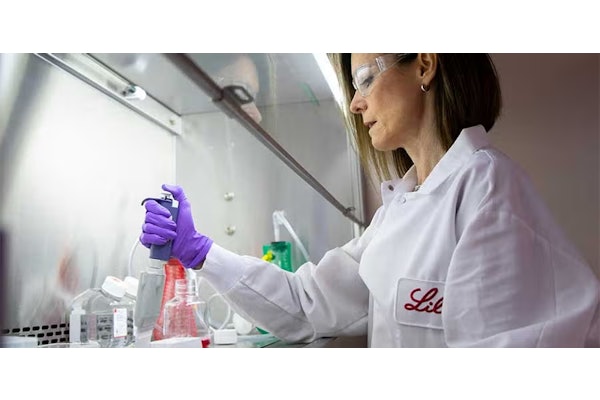Key Takeaways:
· Eli Lilly and Company announced it is building the most powerful supercomputer owned and operated by a pharmaceutical company, in collaboration with NVIDIA.
· Scientists will be able to train AI models on millions of experiments to test potential medicines, dramatically expanding the scope and sophistication of drug discovery efforts
· Beyond discovery, Lilly plans to leverage the supercomputer to shorten development cycles and help get medicines to people faster.
Late last month, Eli Lilly and Company announced it is building the most powerful supercomputer owned and operated by a pharmaceutical company, in collaboration with NVIDIA. The supercomputer will power an "AI factory," a specialized computing infrastructure that manages the entire AI lifecycle from data ingestion and training to fine-tuning and high-volume inference.
Put into simple terms, the AI supercomputer will ultimately make discovering new drugs simpler and faster.
“The challenge in drug discovery is scale: the number of possible chemical compounds is astronomical and evaluating each one as a drug candidate requires simulating complex molecular interactions—an extremely resource-intensive task,” says Thomas Fuchs, SVP and Chief AI Officer, Eli Lilly and Company. “Historically, limited computational power meant scientists could only process one molecular design or simulation at a time, forcing difficult trade-offs and slowing progress. With the supercomputer, Lilly has the potential to run numerous molecular design processes simultaneously, rapidly exploring chemical space that was previously inaccessible.”
The new supercomputer and AI factory enable rapid learning and iteration. Scientists will be able to train AI models on millions of experiments to test potential medicines, dramatically expanding the scope and sophistication of drug discovery efforts. A number of these proprietary AI models will be available on Lilly TuneLab, a collaborative federated AI/ML drug discovery platform created to expand access to advanced discovery tools across the biopharma ecosystem.
“Lilly has invested decades and billions of dollars building a comprehensive dataset and is now sharing the intelligence from that investment. By democratizing access to these capabilities within Lilly TuneLab, we can accelerate discovery for everyone, which ultimately results in faster delivery of new medicines to patients who need them,” says Fuchs. “TuneLab uses a federated learning infrastructure, which enables biotechs to tap into powerful proprietary AI models while keeping their own data private and separate from other users. As more companies participate, the models improve, benefitting all users.”
TuneLab will continue evolving its suite of available models, including the addition of workflows that incorporate select NVIDIA Clara open-source models.
Digging into the AI
Beyond discovery, Lilly plans to leverage the supercomputer to shorten development cycles and help get medicines to people faster.
"The AI industrial revolution will have its most profound impact on medicine, transforming how we understand biology," says Kimberly Powell, vice president of health care at NVIDIA. "Modern AI factories are becoming the new instrument of science — enabling the shift from trial-and-error discovery to a more intentional design of medicines. With its deep scientific heritage and commitment to innovation, Lilly stands as a global leader at the forefront of this new era of medical discovery."
These new scientific AI agents can support researchers in reasoning, planning, and collaborating across digital and physical environments. With advanced medical imaging, scientists benefit from a clearer view of how diseases progress and can develop new biomarkers for more personalized care. Manufacturing processes can benefit from digital twins together with NVIDIA's robotic technologies to improve production efficiency and reduce downtime.
"Lilly is shifting from using AI as a tool to embracing it as a scientific collaborator," says Fuchs. "This isn't just about speed, but rather interrogating biology at scale, deepening our understanding of disease and translating that knowledge into meaningful advances for people served by Lilly medicines as well as the broader life sciences ecosystem."
How it all works
Fuchs described that Lilly’s internal data includes millions of molecules and experimental results and extracting meaningful patterns from this data to train advanced AI models demands immense processing power and memory. Training large models for molecular property prediction or generative chemistry requires specialized hardware and the ability to process data in parallel at scale.
The supercomputer enables the creation of foundational AI models trained securely and compliantly on Lilly’s internal data—including millions of “negative” results that are invaluable for learning. With these models, Lilly can rapidly screen and prioritize vast libraries of potential molecules, predicting their properties, efficacy, and safety profiles in silico before any lab work begins.
“It also allows for scientists to simulate complex biological interactions—such as how a molecule binds to a target protein or its likely metabolic pathways—at a scale and speed that was previously impossible,” says Fuchs. “This allows scientists to identify the most promising candidates and anticipate potential issues much earlier in the process.”
As more AI and supercomputer tools emerge, a common workforce concerns arises when computers seem to be replacing human jobs. But Fuchs assure that this is not the case.
“Our goal is to empower scientists, engineers, and technologists with advanced tools that enhance their work, accelerate innovation, and unlock new possibilities in medicine. To support this, Lilly is actively investing in workforce development and will be equipping appropriate teams with new skills and training to use these AI capabilities responsibly and effectively, ensuring people remain at the center of innovation,” he says.
In fact, Fuchs say that Lilly is currently hiring for a range of technology roles. And in response to more technology and AI comes the need for increased attention to data and privacy.
“We have a dedicated Responsible AI team that actively supports AI projects, helping guide the development of solutions to be safe, effective, and equitable,” says Fuchs.
Lilly builds privacy and security controls into AI development from the start, by obtaining consent as appropriate, minimizing identifiable data, and applying strong safeguards.
“Techniques like tokenization, pseudonymization, and encryption protect patient information, supported by a governance framework with regular audits and monitoring,” says Fuchs. “Our processes align with global standards such as GDPR, HIPAA, NIST, and FDA guidance, and are continually updated to meet evolving expectations. Our cross-functional governance team sets guardrails, approves use cases, and drives responsible innovation through bias testing, audits, and monitoring.”
In accordance with Lilly's existing sustainability commitments, including carbon neutrality by 2030, the supercomputer will run on 100% renewable electricity within existing Lilly facilities and use Lilly's existing chilled water infrastructure for liquid cooling.





















